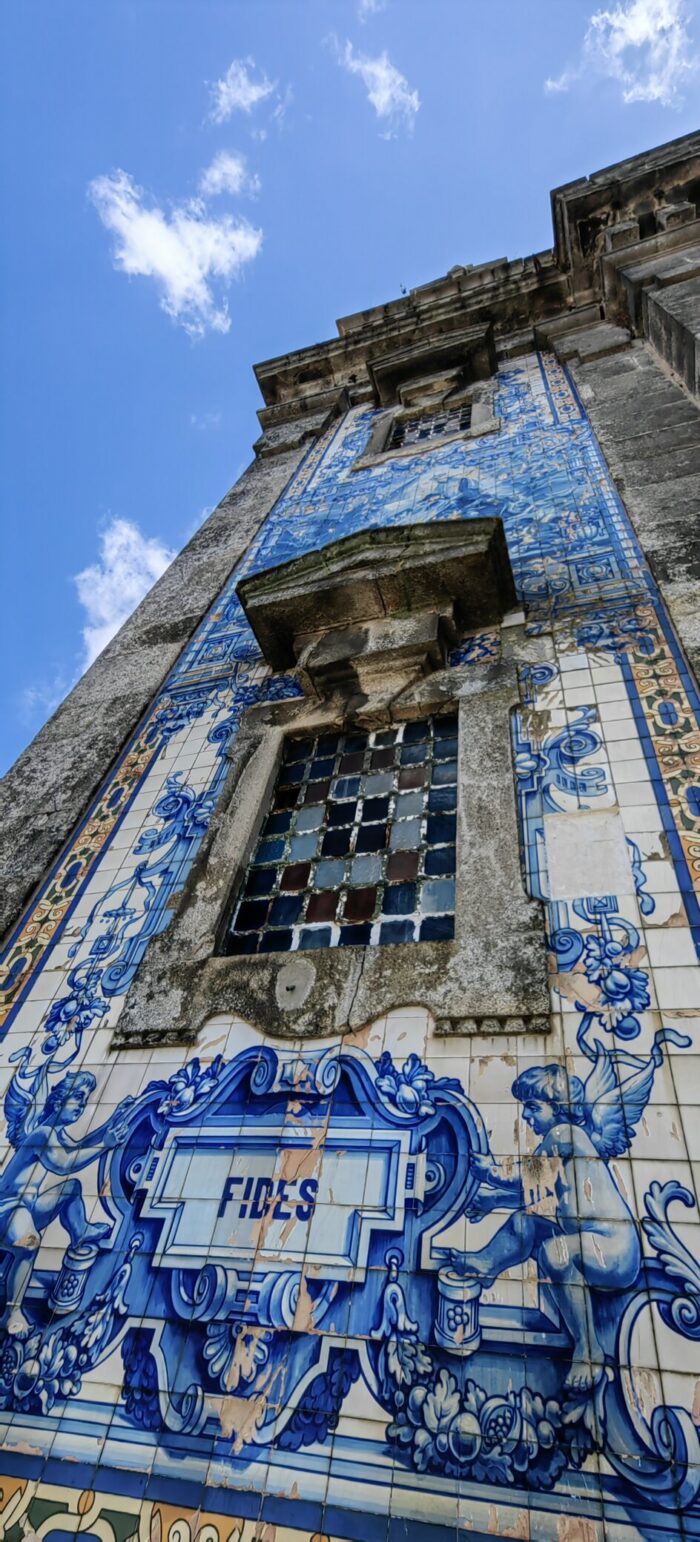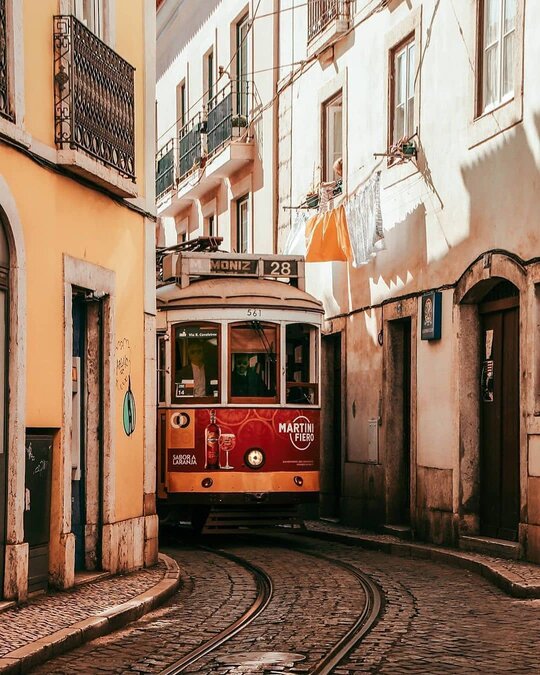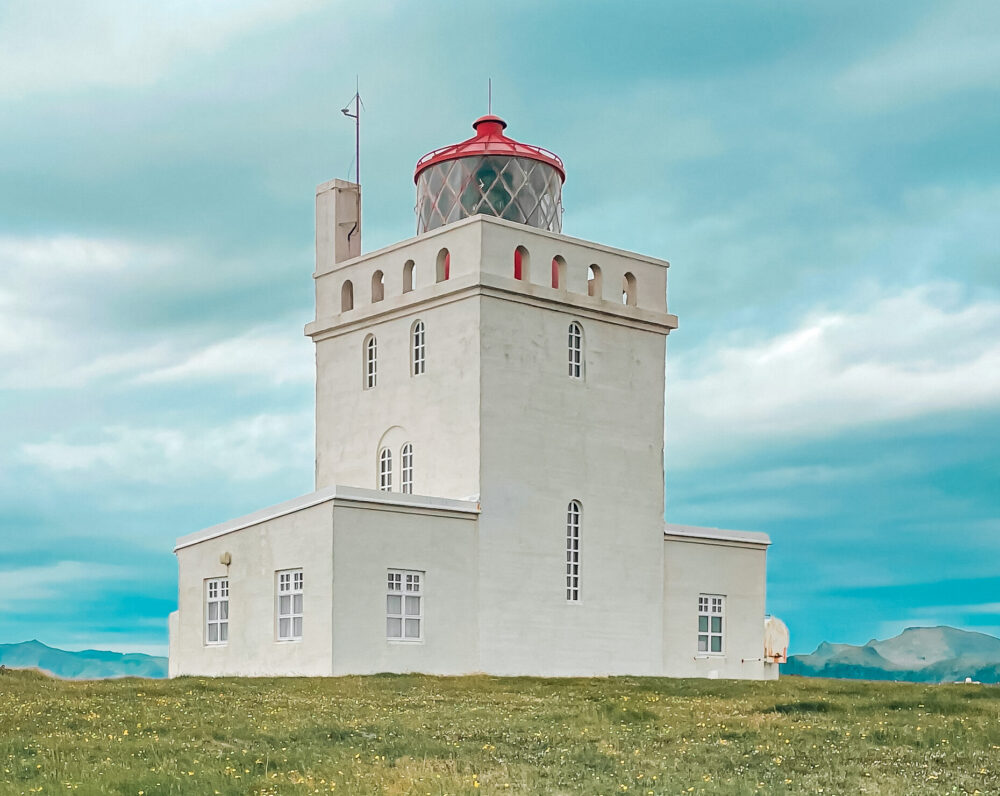Courtney Hade is my friend, ex-colleague (notable fact: I baked her a gluten-free rainbow cake for her last day at work and I am NOT a baker – so she made an impression!), intrepid traveller, health and wellness guru, and one of my minimalist heroes, maybe without even setting out to be. Last year, Court and her new hubby Drew quit their jobs, packed up a 4WD and a caravan, and took off around Australia for nine whole months. In this awe-inspiring display of grabbing life by the balls, Court not only lit up my Facebook feed with amazing pictures from corners of the country I hadn’t even heard of, she also inspired me to think differently about what a full life meant. I’d say Court’s a bit of a natural minimalist (she ate weird leftovers out of jars long before it was trendy), but life on the road cemented a lot of her ideas about what’s important. She’s the perfect person to share some insights about finding minimalism on the road – and taking it home again. Enjoy!
- A version of this article appeared on The Ethical Wardrobe.
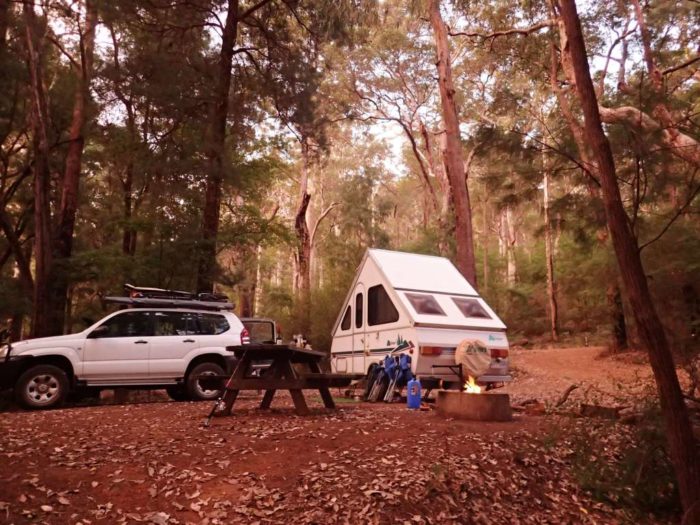
The simple life – it’s pretty effing beautiful, huh?
You and Drew went from living in a comfortable two bedroom apartment of your own to living in a caravan for nine months. This meant a pretty huge downgrade in the quantity of stuff you could realistically have. Was that daunting when you were preparing and starting out?
Hell yes! Drew and I set ourselves a major challenge to leave our jobs and downsize our lives to travel this gorgeous country of ours for nine months. Screw waiting for retirement, we wanted to see the sights while we were young enough to explore every nook and cranny.
We rented out our newly renovated apartment, bought a 4WD, packed up our tent, and borrowed the family caravan to make our dream a reality. When preparing for our adventure around Australia, I’ll admit I was freaking out about how we would cope.
We were about to go from a two bedroom apartment filled with the mods and cons of contemporary living – air conditioner, double shower, wardrobe bursting at the seams, and a kitchen fully equipped to store all of the abundance of fresh food that I was consuming – to a 14 foot caravan, with no bathroom, no excess storage space, and a teensy 40 litre car fridge and no power in sight to blitz up green smoothies.
We still had all of the necessary items we needed to survive, but just the thought of “going without” was pretty daunting.
Looking back now, this seems very petty. In truth, while we ditched the everyday household items (television, washing machine, dishwasher, nice crockery, and of course a full wardrobe) we made up for with other camping paraphernalia (satellite phone, Weber bbq, camp oven), all of which we had to fit into a tiny space.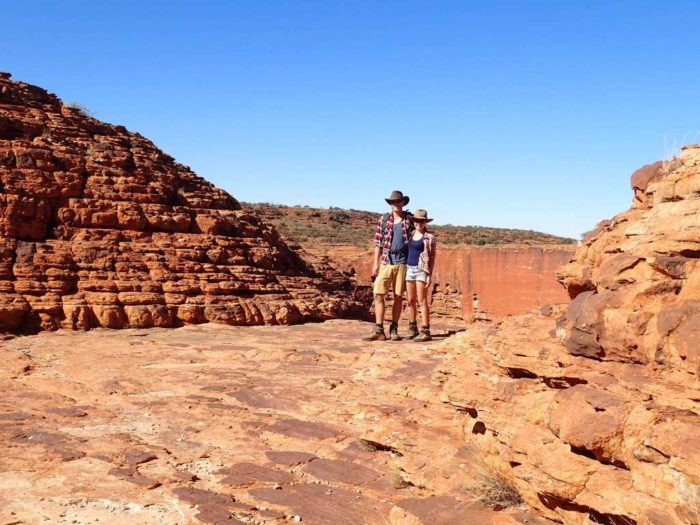
We definitely managed, and the result was a very organized car and caravan with only the essential items. Everything we took we used on an almost daily basis and everything had a purpose.
Tell us about your on-the-road wardrobe. Was fashion/dressing something you thought about during the year? Did you get bored of the things you had? Did they last? Were there things you missed? Did you shop along the way?
As we were to spend most of our time in the car completing the 40,000km trip, comfort and practicality were key. If an item didn’t fit this bill, it didn’t get packed. We only had one Bunnings plastic tub each (about 1 metre long and 30 cms deep (see photo). Also, as we planned to chase the sun around the country we needed sensible, sun-smart gear. There’s a reason you see country folk wearing Akubra hats and collared shirts, and it’s not so city folk have inspiration for Australia Day dress ups parties.
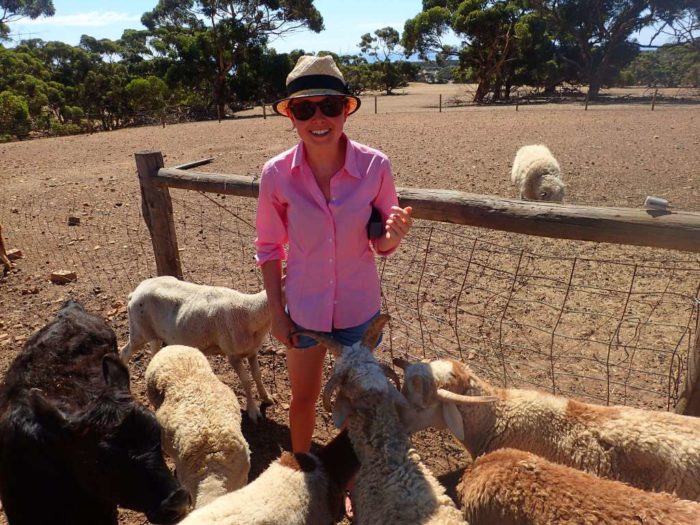
I didn’t buy anything new for an entire year. Shopping was not even on our radar (or in our budget). Five months into our trip, my sister sent me a package of about four long sleeved shirts she’d sourced from [co-ops], which were the best gifts ever after I’d sweated yellow marks through a few shirts already!
I started to prefer dressing in my flanny and shorts. I liked the lack of choice my little tub presented each day, it made getting dressed in the morning much easier.
I did notice though that I had greater anxiety dressing on the occasions that we were in major cities because I didn’t have much “good” stuff, and it seems when we are around more people, we want to look “our best.”
Here’s what I packed:
–1 x “good” pair of shoes and a dress for the odd occasion that we would go out.
–Hiking boots, sneakers, and a pair of thongs.
–Shorts x 2
–Jeans x 2
–Raincoat
–Jumper x 2
–T-shirts x 4
–Swimsuits x 3
–Long-sleeved and collared shirts x 3
–Beanie
–Scarf
–Gloves
–Undies – surely no one wants to know how many? Ok, about 10…
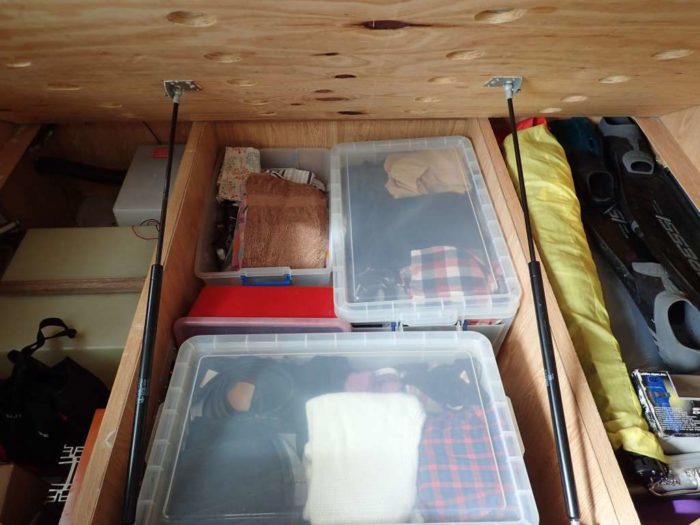
Has your attitude to your wardrobe, and stuff in general changed since you got back?
When we returned to Melbourne I felt overwhelmed by the amount of stuff that we owned. We went from surviving – no not even surviving, but thriving – with so little possessions to facing boxes and cupboards and an entire shed filled with “stuff” when we returned “home.” Stuff we’d managed to live without for nearly a year.
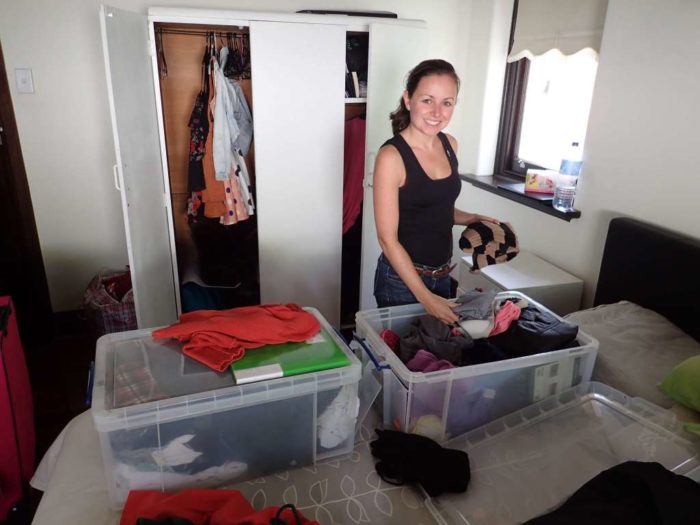
Trying to make sense of our stuff when we got back.
Bit by bit, we are minimizing our lives, giving away what we no longer need and actually using the stuff that we do have – like the Royal Dalton tea set that was my nanna’s I now use regularly, because what’s the point having things sitting on display unused?
I am consciously trying to create a home where everything has a functional use, including my wardrobe, which I will admit has a bit of work to go.
But I no longer want to hold on to three sequin dresses just in case “one day” I might get invited to a dress up party and want to go as a disco queen…
What does an ethical wardrobe look like for you?
One that is not filled with random items that are purchased for the sake of it because it was cheap. I still only hit up [co-ops] but am trying to only purchase items for their $1 bargain bin if I absolutely need the item.
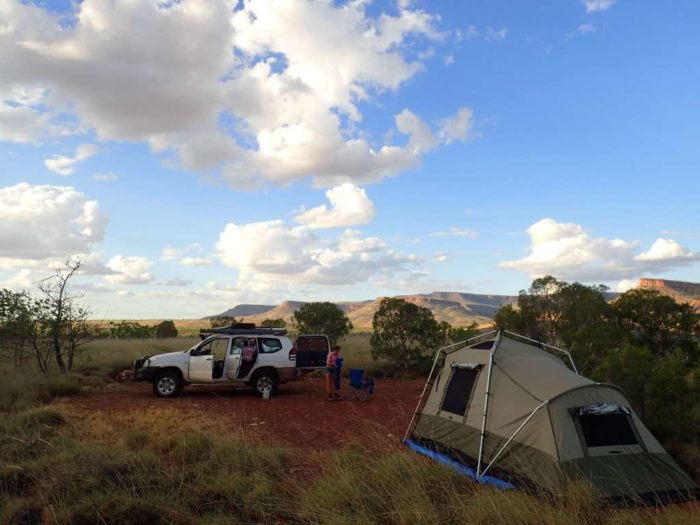
Do you consider yourself a minimalist? What does minimalism mean to you?
I get overwhelmed when I am surrounded by too much “stuff.” I find it weighs me down energetically, and when it comes to my home, I like to have everything in its place as it makes me feel at ease. So I guess in that regard I am a little bit of a minimalist, and I definitely believe people have too many possessions in general.
From our trip borrowing Drew’s family caravan and seeing how little we can survive from, we’ve started to consciously find ways to do things without consuming for the sake of it. Our garden wedding recently was created using borrowed furniture from friends and family, gifts made from home produce, and our new home is furnished with items others no longer need and have been happy to give away.
If we all pool our resources I think we would find we would all consume a lot less.
__
Have you tried traveling as a minimalist?
Related: How to Reduce Your Carbon Footprint while Traveling
5 Life Lessons from Traveling in Bolivia
11 Best Tips for Stress-Free Travel
Get more like this–sign up for our newsletter for exclusive inspirational content!
__
Photos: Courtney Hade


